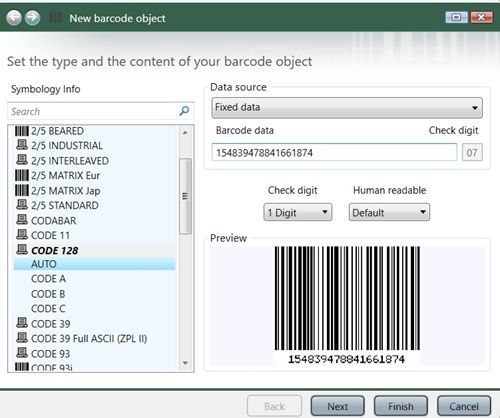Please select your location & language for the best website experience
 Code 128 is one of the most common types of 1D barcodes and can be made up of numerics, alphanumerics, punctuation, symbols, and more. Every Code 128 barcode can encode any of the 128 ASCII (American Standard Code for Information Interchange) characters, including three black and three white bars spaced in each symbol. ASCII is a character encoding standard for communicating electronically. You can create Code 128 barcodes in LABELVIEW and CODESOFT, which both feature a quick-reference ASCII table in the formula tool, helping users look up the values without leaving the software.
Code 128 is one of the most common types of 1D barcodes and can be made up of numerics, alphanumerics, punctuation, symbols, and more. Every Code 128 barcode can encode any of the 128 ASCII (American Standard Code for Information Interchange) characters, including three black and three white bars spaced in each symbol. ASCII is a character encoding standard for communicating electronically. You can create Code 128 barcodes in LABELVIEW and CODESOFT, which both feature a quick-reference ASCII table in the formula tool, helping users look up the values without leaving the software.
GS1-128 (formerly UCC / EAN-128) is a version of a Code 128 barcode that encodes specific data such as serial numbers and expiration dates. GS1 is a global standard used for traceability throughout the supply chain and meets compliance for many industries. End users in the retail or shipping & receiving industry will benefit the most from using a Code 128 barcode or a GS1-128 barcode. GS1-128 barcodes are very common in shipping & receiving, food & beverage, retail, healthcare, and the medical device industry.
Download Code 128 barcode generator software and start creating compliant labels today!
You can create a Code 128 barcode with barcode generator software such as LABELVIEW or CODESOFT. Helpful wizards make it easy to choose the type of barcode you need, type in your data, and generate the barcode. Once the barcode is generated, you can add it to your label and begin the design process, all in just a few steps.
Code 128 barcodes are commonly used for shipping and packaging labels, ID cards, healthcare and medical device products, retail tags, and in logistics and transportation.
Code 128 barcodes are more compact and can encode a large amount of data compared to other simple barcodes like UPC-A and Code 39. Code 128 barcodes are versatile barcodes with better tracking purposes because they can hold a wider range of characters, which helps store a large amount of data compared to a regular barcode, in the same amount of space. Code 128 even has better security with mandatory check digits.
Check digits are the last digit of a barcode number and are calculated using an algorithm and other numbers on the barcode. If the check digit doesn’t match the numbers that were calculated, an error will be identified. Check digit calculators that are built into your barcode labeling software help streamline this process.
Code 128 barcode subtypes are known as Code 128A, Code 128B, and Code 128C. Each subtype encodes varying data:
Code 128 barcodes are the standard barcode, while GS1-128 is a variant, and longer version of a Code 128 barcode. It is defined by GS1 and uses Application Identifiers, which are prefixes used in barcodes to define the meaning and format of data.
An example of a GS1-128 barcode could include a GTIN ® (Global Trade Item Number®), serial numbers, and expiration dates, which helps the traceability of items through a supply chain. There are numerous Application Identifiers, or types of data that GS1 barcodes can include. TEKLYNX software is updated to include new or changed Application Identifiers with each new product release. Find out more about Application Identifiers with GS1.
If you have questions along the way, contact TEKLYNX in your region.
© Copyright 2025 TEKLYNX CORPORATION SAS. All Rights Reserved.